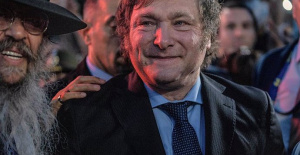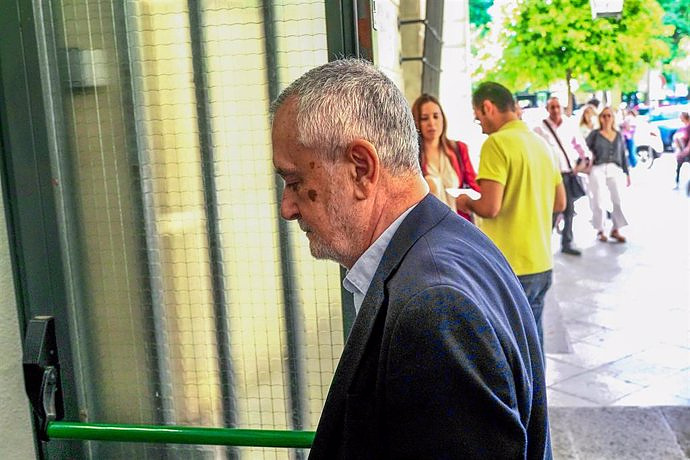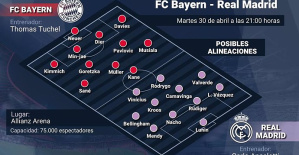He alleges that the sentence responds to "the most serious crimes committed in the Public Administration" and "cannot go without a punitive response."
The Prosecutor's Office has sent different writings to the Court of Seville, in which it finally opposes the requests for pardon made by the former socialist president of the Junta de Andalucía José Antonio Griñán and seven other former officials of the regional Administration sentenced to prison terms. for embezzlement in the "specific procedure" for financing fraudulent employment regulation files (ERE) financed with regional funds, in view of the ruling that said judicial instance must issue on such requests for pardon before the Ministry of Justice, which must take a decision on the matter.
The First Section of the Court, specifically, must rule before the Ministry of Justice on the petitions of eight of the nine former socialist leaders of the Junta de Andalucía who have requested to be pardoned from their respective prison sentences for embezzlement in the financing mechanism of fraudulent employment regulation files.
This is José Antonio Griñán, sentenced to six years and one day in prison but whose prison sentence is suspended thanks to the prostate cancer he suffers from and in accordance with article 80.4 of the Penal Code; the former socialist Minister of Employment Antonio Fernández, with a sentence of seven years, eleven months and one day in prison; former Treasury Minister Carmen Martínez Aguayo, sentenced to six years and two days in prison; the former socialist Minister of Innovation Francisco Vallejo, sentenced to seven years and one day in prison; the former Socialist Deputy Minister of Employment Agustín Barberá, sentenced to seven years and one day in prison; the former Deputy Minister of Innovation Jesús María Rodríguez Román, sentenced to six years in prison; the former general director of IFA/IDEA Miguel Ángel Serrano, sentenced to six years, six months and one day in prison; and the former Socialist Minister of Employment and Technological Development José Antonio Viera, sentenced to seven years and one day in prison, who nevertheless enjoys the third degree of prison for health reasons after having served several months in prison.
Currently, all of them are serving prison sentences except Griñán, whose prison sentence is suspended, and Viera, who is in the third degree of prison.
Regarding the former general director of Labor of the Junta de Andalucía Juan Márquez, also sentenced to prison in this case, it will be the Supreme Court that will rule before the Ministry of Justice on his request for pardon against his prison sentence, since after the initial sentence of the First Section of the Court, which resulted in a sentence of disqualification or disqualification and prison for 19 of the 21 former high-ranking socialist officials tried; The Supreme Court partially reversed said initial resolution, reducing Márquez's prison sentence to three years, a sentence currently suspended.
The Prosecutor's Office states in relation to the pardon requests of Griñán, Antonio Fernández, Carmen Martínez Aguayo, Francisco Vallejo, Agustín Barberá, Jesús María Rodríguez Román, Miguel Ángel Serrano and José Antonio Viera, that the pardon "is only justified in an exceptional way with purposes that remedy "situations considered of notorious injustice as a consequence of the strict and inevitable application of the law" or cases "in which the execution of the sentence would no longer fulfill the function of resocialization"; since according to the Public Ministry, "the examination After analyzing the arguments put forward in each of the sections to justify the request for partial pardon of the sentences imposed, a request supported by reasons of justice and equity provided for in article 11 of the pardon law, it reveals that none of them is related to the nature and purpose of the institute of pardon and its regulatory norm".
Faced with the arguments contained in the pardon request formalized by Griñán's family, "expressly for reasons of humanity and equity" as he is now 78 years old, also citing his "impeccable life trajectory" and that "after more than 40 years of public service from the highest responsibilities, he has never obtained any remuneration other than his salary as a civil servant" nor has he had "personal or family enrichment"; The Prosecutor's Office indicates that "the criminal conduct carried out by the convicted person has been prosecuted with fairness within the abstract framework of the extension of the penalties contemplated by the criminal law for the crimes subject to conviction, crimes that do not require their own economic enrichment."
In this sense, the Prosecutor's Office recalls that the ruling of the Supreme Court that rejected the cassation appeals of these accused against the initial conviction of the First Section of the Court determines that "the personal gain of the abductor is not required, but rather his actions with intention of any benefit, even non-property, that will exist, even if the intention to profit refers to the benefit of a third party.
Furthermore, in response to the arguments of "honesty and honesty" alleged in the demand for pardon, the Prosecutor's Office warns that the sentence derives from "the most serious crimes committed within the Administration, with an obvious and flagrant breach of probity." in the exercise of public office". "It should not be forgotten that during the mandate of the accused, budgetary credits were available for the granting of illegal aid for an amount greater than 427 million euros," highlights the Public Ministry.
"IT CANNOT BE LEFT WITHOUT A PUNITIVE RESPONSE"
Thus, the Prosecutor's Office concludes that "the conduct prosecuted cannot be left without a punitive response through the partial commutation of the prison sentence imposed, a claim that exceeds the exceptional nature that constitutes the pardon. In this scenario, the retributive purposes, prevention and rehabilitation of sentences do not justify or allow the granting of a pardon". partial".
Finally, the Prosecutor's Office recalls again in its writing that the Supreme Court ruling rejecting the appeals of these eight convicts defines as "political corruption" the typical nature of the embezzlement attributed to these former leaders of the Junta de Andalucía.

 Exploring Cardano: Inner Workings and Advantages of this Cryptocurrency
Exploring Cardano: Inner Workings and Advantages of this Cryptocurrency Seville.- Economy.- Innova.- STSA inaugurates its new painting and sealing hangar in San Pablo, for 18 million
Seville.- Economy.- Innova.- STSA inaugurates its new painting and sealing hangar in San Pablo, for 18 million Innova.- More than 300 volunteers join the Andalucía Compromiso Digital network in one month to facilitate access to ICT
Innova.- More than 300 volunteers join the Andalucía Compromiso Digital network in one month to facilitate access to ICT Innova.-AMP.- Ayesa acquires 51% of Sadiel, which will create new technological engineering products and expand markets
Innova.-AMP.- Ayesa acquires 51% of Sadiel, which will create new technological engineering products and expand markets Real Madrid saves a draw in Munich and will appeal again to the Bernabéu
Real Madrid saves a draw in Munich and will appeal again to the Bernabéu The Congress of Argentina approves the omnibus law that allows the privatization of some public companies
The Congress of Argentina approves the omnibus law that allows the privatization of some public companies Marjane Satrapi, Princess of Asturias Award: "I am angry with Borrell, if I had him in front of me I would slap him"
Marjane Satrapi, Princess of Asturias Award: "I am angry with Borrell, if I had him in front of me I would slap him" Judge fines Trump $9,000 for contempt of court and considers sending him to prison during trial
Judge fines Trump $9,000 for contempt of court and considers sending him to prison during trial How Blockchain in being used to shape the future
How Blockchain in being used to shape the future Not just BTC and ETH: Here Are Some More Interesting Coins Worth Focusing on
Not just BTC and ETH: Here Are Some More Interesting Coins Worth Focusing on Valencia unanimously approves the ordinance to allocate spaces to test innovative initiatives
Valencia unanimously approves the ordinance to allocate spaces to test innovative initiatives UPV researchers promote a paid master's degree as a "talent factory" in integrated photonics
UPV researchers promote a paid master's degree as a "talent factory" in integrated photonics A spin-off of the UV works on obtaining high-resolution 3D biomedical images in real time
A spin-off of the UV works on obtaining high-resolution 3D biomedical images in real time They create a bank of machinery sounds to prevent breakdowns through artificial intelligence
They create a bank of machinery sounds to prevent breakdowns through artificial intelligence A million people demonstrate in France against Macron's pension reform
A million people demonstrate in France against Macron's pension reform Russia launches several missiles against "critical infrastructure" in the city of Zaporizhia
Russia launches several missiles against "critical infrastructure" in the city of Zaporizhia A "procession" remembers the dead of the Calabria shipwreck as bodies continue to wash up on the shore
A "procession" remembers the dead of the Calabria shipwreck as bodies continue to wash up on the shore Prison sentences handed down for three prominent Hong Kong pro-democracy activists
Prison sentences handed down for three prominent Hong Kong pro-democracy activists ETH continues to leave trading platforms, Ethereum balance on exchanges lowest in 3 years
ETH continues to leave trading platforms, Ethereum balance on exchanges lowest in 3 years Investors invest $450 million in Consensys, Ethereum incubator now valued at $7 billion
Investors invest $450 million in Consensys, Ethereum incubator now valued at $7 billion Alchemy Integrates Ethereum L2 Product Starknet to Enhance Web3 Scalability at a Price 100x Lower Than L1 Fees
Alchemy Integrates Ethereum L2 Product Starknet to Enhance Web3 Scalability at a Price 100x Lower Than L1 Fees Mining Report: Bitcoin's Electricity Consumption Declines by 25% in Q1 2022
Mining Report: Bitcoin's Electricity Consumption Declines by 25% in Q1 2022 Oil-to-Bitcoin Mining Firm Crusoe Energy Systems Raised $505 Million
Oil-to-Bitcoin Mining Firm Crusoe Energy Systems Raised $505 Million Microbt reveals the latest Bitcoin mining rigs -- Machines produce up to 126 TH/s with custom 5nm chip design
Microbt reveals the latest Bitcoin mining rigs -- Machines produce up to 126 TH/s with custom 5nm chip design Bitcoin's Mining Difficulty Hits a Lifetime High, With More Than 90% of BTC Supply Issued
Bitcoin's Mining Difficulty Hits a Lifetime High, With More Than 90% of BTC Supply Issued The Biggest Movers are Near, EOS, and RUNE during Friday's Selloff
The Biggest Movers are Near, EOS, and RUNE during Friday's Selloff Global Markets Spooked by a Hawkish Fed and Covid, Stocks and Crypto Gain After Musk Buys Twitter
Global Markets Spooked by a Hawkish Fed and Covid, Stocks and Crypto Gain After Musk Buys Twitter Bitso to offset carbon emissions from the Trading Platform's ERC20, ETH, and BTC Transactions
Bitso to offset carbon emissions from the Trading Platform's ERC20, ETH, and BTC Transactions Draftkings Announces 2022 College Hoops NFT Selection for March Madness
Draftkings Announces 2022 College Hoops NFT Selection for March Madness























